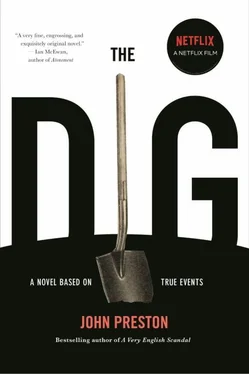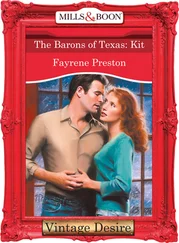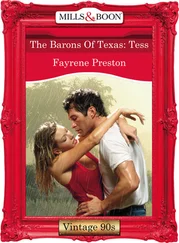Pushing his chair back, he escorted me down the corridor. I glanced into the kitchen as we went past. On the table, two pork chops lay sandwiched between glass plates. At the door Mr. Swithin stopped and exhaled. I took two half-crowns from my purse. Pocketing them in one fluid movement, he asked if he should expect me at the same time next week.
I told him that this might not be convenient — just at that moment I was not sure if I could face any more disappointment. But I could see my terseness had upset Mr. Swithin; it’s not for nothing that he calls himself a sensitive. Softening my tone, I said, “Perhaps I could telephone you when I have decided.”
“Of course.”
He stood aside, holding the door by its top corner so that I had to pass underneath the arch of his arm. In the lift, I sat down on the bench seat as it made its descent. When it reached the ground floor, I found I scarcely had the strength to pull back the gates. Slowly, I descended the steps to the pavement.
Once there, I held on to a railing for support. As soon as I had done so, I found that I did not dare take my hand away. Everything tipped and lurched around me. People walked past. One or two of them glanced in my direction without appearing to notice anything unusual. Several minutes went by and still this tipping sensation continued. I began to wonder what I was going to do. I could not help thinking that I was being punished somehow, principally for my lack of faith. This was what happened to people who did not believe, or who did not believe enough. They were cast out, abandoned, left struggling to fend for themselves.
Despite the sunshine, the railing was very cold to the touch. So cold that I seemed to be losing all feeling in my fingers. Reaching behind me, I transferred my grip from one hand to the other. At that moment, a taxi cab turned off the Earls Court Road and drove into the square. The leap of hope that this brought with it was immediately dashed when I saw that its “For Hire” sign was not illuminated.
Then, as the taxi continued to come closer, I noticed that nobody was sitting in the back.
I held up my spare hand and waited. The taxi drove round the remaining two sides of the square and drew up beside the curb. I remained where I was, unsure how I was ever going to cross the expanse of pavement that lay between us. It was like having to ford a stream.
The cabbie sat waiting behind the steering wheel, staring straight ahead, his motor idling. Still, I could not bring myself to let go. The cabbie turned to look at me, his brow knotting into a question mark. As he did so, I launched myself, quite certain that I would fall — yet finding my legs scurrying about beneath me, carrying me forward.
Once inside the taxi, I asked to be taken to Liverpool Street. The journey seemed to pass in a long horizontal blur. By the time we had arrived, however, everything seemed to have righted itself: the buildings, the lamp-posts, even the people. Even so, I found that I had no desire to be in any closer proximity to anyone than necessary. I therefore bought a first-class ticket and shut myself away in an empty compartment, hoping that nobody else would come in. Mercifully, no one did.
The train steamed through deep brick gulches and out towards the suburbs. When the houses at last disappeared, an enormous sense of relief came over me as all around the fields flattened and stretched away.
Ellen was unusually quiet that evening. She scarcely spoke as she helped me out of my traveling clothes and into my dinner dress. I was touched by her tact, by the way she moved around me in this understanding silence.
It was only while she was fastening the buttons on my sleeves that I noticed her fingers were trembling.
“What is it, my dear?”
She did not answer; she simply continued fastening my buttons.
“There we are,” she said, pulling my cuffs straight once she had finished. While her voice sounded steady enough, there was some uncertainty about her lower lip.
“Has something upset you?” I asked. Still she did not answer. “If there is anything you wish to tell me, I can promise that nothing will go any further than this room.”
At this, she pulled back abruptly. “There’s nothing the matter with me, ma’am,” she said. “Nothing at all… Although it’s very kind of you to ask.”
I stood and waited by the mirror while Ellen fetched the clothes brush. She wielded the brush with her customary dexterity, only just letting the bristles touch the material. While she was doing so, I realized it had been several days since she had asked if I would like my hair combed before dinner. Perhaps this too was a form of tact.
The following afternoon it started to rain again. When I went out to the mounds after tea, I found Mr. Brown by himself in the shepherd’s hut. Immediately, he offered to come outside, but I told him that I was quite happy to join him. He helped me up the steps, shook out my umbrella and swept a place clean with his hand for me to sit.
Jacobs and Spooner, it turned out, had already left for the day, it being impossible to do any further digging in this weather.
I had barely sat down when Mr. Brown said, “I don’t think there’s anything there, Mrs. Pretty.” He spoke in more of a rush than usual, as if this was something he’d been brooding on for some time and wished to get off his chest.
“Are you sure?”
“Not sure, no. But I’ve got a feeling, if you like.”
“Is that what your nose is telling you?”
“I’m afraid so.”
The sense of dejection was even stronger than I had expected. It seemed to sweep through me like a river, pushing everything aside.
“What do you suggest, then, Mr. Brown?” I asked.
“I don’t rightly know. That’s what I’ve been thinking about. Trying to work out what’s best.”
He appeared just as downcast as I was. We sat in silence for a while. Partly in order to give myself something else to think about and partly because it was something that had made me curious for some time, I asked how he had first become interested in archaeology.
“My granddad used to do a bit of scratching about,” he said. “Just as a hobby, mind. Then my dad taught me about soil. He’d made a special study of it — Suffolk soil. He knew just about everything there was to know. They said you could show him a handful from anywhere in the county and he could tell you whose farm it had come from.”
“How extraordinary.”
“When I was fifteen, I received a certificate signed by Arthur Mee himself, saying that I had a reliable knowledge of geography, geology and astronomy. After I left school, I tried all sorts of things — farming, keeping goats, being a milkman. I even sold insurance for a while. Trouble was, I couldn’t stick at anything. I spent all my time reading, anything I could find. It scarcely mattered what. May says I have far too many books. They nearly drive her mental.”
“And how did you meet Mr. Maynard?”
“I met Mr. Maynard at the Suffolk Institute. The Reverend Harris from Thornden introduced us. Do you know the Reverend Harris?”
I shook my head.
Mr. Brown chuckled. “He reads even more than me, the reverend does. About archaeology especially. And scripture, of course. I’d done some digging of my own by then. Mainly around the Roman kilns at Wattisfield. Mr. Maynard asked if I might like to do some freelance work for the museum. Bits and pieces, you know. Whatever they chose to send my way.”
We sat and listened to the rain falling on the roof. The smell of wet grass came up through the floorboards. Mr. Brown was sitting with his elbows resting on his knees.
“I wonder if I might ask a question, Mrs. Pretty,” he said.
“By all means.”
“It’s just — it’s just that I can’t help thinking, why now?”
Читать дальше












